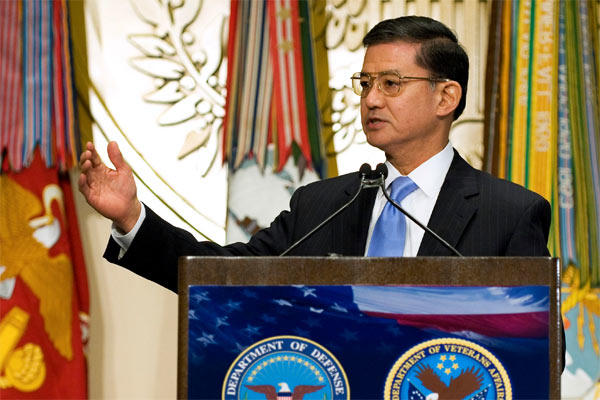Two public calls for the resignations of top Department of Veterans Affairs officials and one group's push to have the White House take the lead in fixing a longstanding VA claims backlog has put the veterans' agency in the center of a political storm.
This may be the Iraq and Afghanistan Veterans of America's annual "Storm the Hill" lobbying effort on Capitol Hill, but it is the VA getting battered, leaving other veterans groups to defend the reputations of the embattled VA leadership. Some even claim the eruptions were orchestrated by IAVA.
It was a week that began with a Time magazine columnist's demand for VA Secretary Eric Shinseki's resignation and continued on Tuesday with the chairman of the House Veterans Affairs Committee saying the chief of the Veterans Benefits Administration should resign. Through it all, IAVA collected more than 34,000 signatures asking President Obama to take control of the backlog crisis.
On Wednesday an official with the Disabled American Veterans told the chairman of the House Veterans Affairs Committee that he was making "an extreme mistake" in calling for the resignation of the Veterans Benefits Administration chief because of the backlog in VA claims.
Barry Jesinoski, DAV's executive director, wrote to Rep. Jeff Miller, R-Fla., after the hearing that Miller called for Undersecretary for Benefits Allison Hickey, a retired Air Force brigadier general, to resign.
"I told him that it was an extreme mistake on their part, and that they were not carrying out the wishes or even listening to the major VSOs, all of whom support General Hickey," Jesinoski said.
Jesinoski's defense of Hickey was the second time in days that the DAV leader went to the defense of a VA official whose competence was being questioned and resignation sought. In a widely circulated column last week, Time magazine writer Joe Klein blasted VA Secretary Eric Shinseki over the backlog, which now stands at about 900,000, and said he should quit.
Jesinoski called the backlog of claims "horrendous," but said his organization believes Shinseki is doing his best.
"It's not our business [at the DAV] to defend the secretary or defend the VA, but to fulfill the promises made to the men and women who served," he said. "But that's what we're doing by defending what is going on at the VA, with the VBA [Veterans Benefits Administration] transformation and what Secretary Shinseki has been doing overall."
Nor was Jesinoski alone in defending Shinseki. The American Legion, the Veterans of Foreign Wars, and the Student Veterans of America all issued statements of support for Shinseki.
The VA itself, not surprisingly, ignored Klein's column -- not the first he's written urging Shinseki to go -- but issued a statement making it clear Hickey will be staying on to oversee the VA's plan to eliminate the backlog by the end of 2015 by building a digital disability claims system.
The VA's critics are skeptical the department will achieve that goal, especially given that one plan to create a seamless health record system between the Defense Department and VA has fallen apart. Currently, the average wait times for new veteran claimants to see a VA doctor can be up to 600 days, and more in some parts of the country.
Decisions on claims may take more than a year.
Miller acknowledged in a statement to Military.com on Wednesday that Hickey inherited a tough situation and is doing her very best.
"But VA's disability benefits backlog problem is getting worse, not better, and veterans are suffering as a result," he said. "In fact, when it comes to disability benefits claims processing, VA is losing ground or stagnating ... That is why I believe a new under secretary for benefits would be best suited to help VA formulate a realistic plan for eliminating the department's disability benefits backlogs and to tell Congress what they need to get the job done."
None of the VSOs defend the backlog and all agree it needs to be fixed.
What they took exception to was Klein's attack on Shinseki. Klein criticized the former Army chief of staff for the backlog; for not using the murder of Afghan civilians by an American soldier to argue for improved veterans' mental health care; and for not being more visible to the public in advocating for vets.
John Hamilton, national commander for the 2-million-member Veterans of Foreign Wars, said what occurred in Afghanistan "was a tragedy, not an opportunity."
"The Department of Defense and the VA expend an enormous amount of resources on programs and outreach to provide mental health counseling to those in need, but you can't mandate any program that first requires someone to voluntarily step forward and ask for help," Hamilton said.
James E, Koutz, national commander of The American Legion, said his organization has "never been shy about identifying deficiencies in VA's operations, facilities and care, but we have found nothing lacking in Shinseki's leadership … We will not stand by silently while an honest man, a decorated veteran, and a sincere advocate is unfairly maligned."
In some respects Klein's column was a rehash of complaints he made against Shinseki in June 2012, when he also called out the VA boss for not returning a New York Times' reporter's phone call and for not contacting Paul Rieckhoff, the founder and director of Iraq and Afghanistan Veterans of America, and other young vets for their advice on how to improve things.
"And if he's not capable of doing that, the President should fire him," Klein wrote.
Klein's column then prompted a New York Times story that quoted Rieckhoff and labeled him one of Shinseki's "more outspoken critics." Rieckhoff also mentioned Shinseki's apparent unwillingness to be out in the public eye. And the paper said the IAVA leader "found it telling" that Shinseki did not use Twitter to reach younger vets.
"If he's not on Twitter, is it because he doesn't understand it?" Rieckhoff told the Times. "Or is it because he doesn't care? I don't know … It's just a reflection of the isolation that our community has seen with the secretary."
Michael Dakduk, executive director for Student Veterans of America and an Iraq and Afghan wars vet, took exception to Klein's column then and Rieckhoff's criticism. Shortly after The New York Times piece came out he said he was disappointed that "some of my peers in the veterans' community" misunderstand Shinseki, who Dakduk said is "less focused on tweeting and more interested in addressing the problems that plague the VA."
Dakduk is disappointed again with Klein's slamming of Shinseki and what he sees as a lack of support for the VA secretary from IAVA. While VSOs and other veterans groups make it a policy not to speak ill of each other in public, Dakduk does not hesitate to accuse IAVA of having a role in the attacks on Shinseki.
It is no coincidence, he said, that Klein's piece came out just before IAVA's annual "Storm the Hill" event.
"This is a concerted effort to attack the Secretary and gain headlines," Dakduk said in an email to Military.com "It's a sad move and gives the perception that the veterans' community is divided in their support of Secretary Shinseki."
He said he is not surprised that IAVA did not come out with a statement defending Shinseki after Klein's column.
Rieckhoff told Military.com that IAVA cannot issue a statement whenever someone writes a column. But he said the group is not calling for Shinseki to resign.
"Our focus is on ending the backlog," he said. "We want [Shinseki] to succeed … but at the same time he needs to hear the ground truth. All too often the VA is not getting the job done."
That is certainly the message IAVA is broadcasting over Capitol Hill this week during its 13th annual "Storm the Hill" lobbying effort. The centerpiece of this year's meetings with White House staff and lawmakers is its "End the VA Backlog" petition. That petition, which had more than 32,000 signatures as of Wednesday, calls for a Presidential commission to resolve the claims backlog.
Rieckhoff said the commission would have to take over some authority from both the VA and the Department of Defense, which has custody of a servicemember's medical records until they are transferred to the VA.
"The bottom line for us is the backlog is a massive problem and it's going in the wrong direction, and the VA is clearly not getting the job done," he said. He likened the VA to a car broken down and the Presidential commission as the way to get it fixed.
"If we can't lift the hood how can we tell what's wrong with it?" he asked.




























